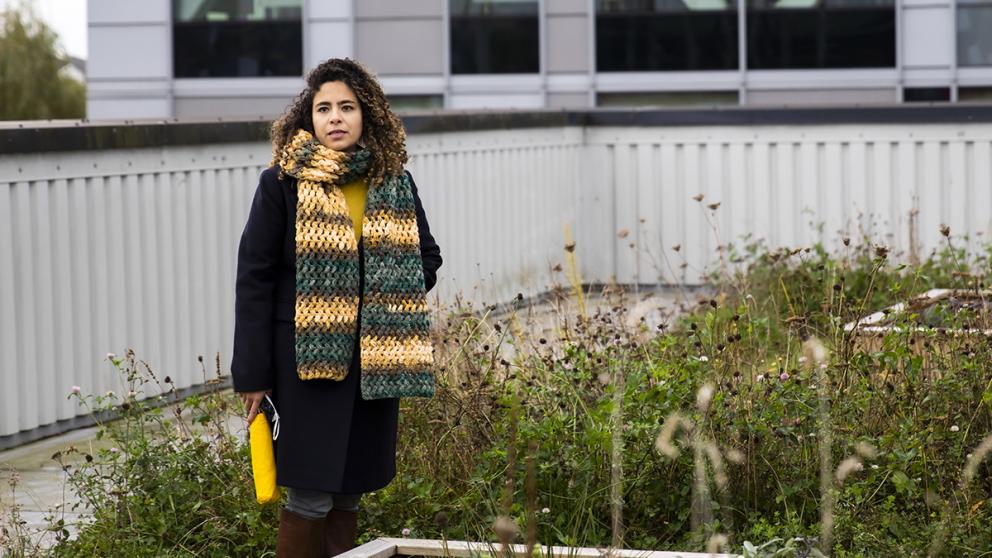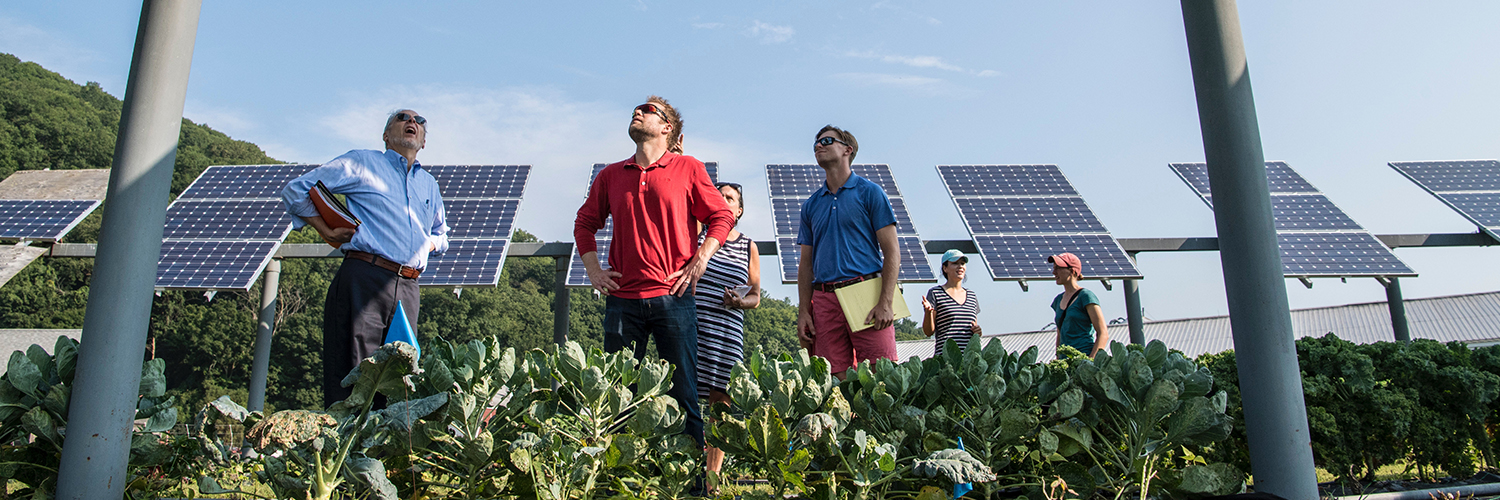
Sustainability
Full-time
Part-time
One year
28 month
September 2026
In a nutshell
With the world’s population predicted to reach 9.7 billion by 2050, improving human welfare, enhancing environmental quality and managing resources, are a global priority. Align your career prospects for the green revolution with our MSc Sustainability postgraduate degree.
Available full and part-time study, this highly-relevant course is perfectly positioned to enable you to take advantage of new and fast-growing career pathways in the emerging green economy.
Delivered via a range of carefully-designed modules, you will have the opportunity to focus your learning on environmental, geographical or combined pathways, as you explore contemporary themes including food security and urban planning.
Salford ranks 8th on People & Planet's University League
People & Planet is the largest student network in the UK campaigning for social and environmental justice. They envision a future in which spiralling inequality, instability, climate crisis and resource depletion are reversed, and a world in which the balance of power in society has fundamentally shifted to an equal world that benefits all of us. University of Salford scored 71.0% and ranked 8th in the University League, with our highest scores in Managing Carbon, Staff and Student Engagement and Education for Sustainable Development.
Award-winning research you’ll learn from
University of Salford has won a prestigious Queen Elizabeth Prize for Education for its world-leading work in sustainable housing and energy efficiency. Through Energy House Labs, students benefit from teaching shaped by cutting-edge research that is helping to reduce energy costs, tackle fuel poverty and design low-carbon homes for the future.
The Queen Elizabeth Prizes for Education form part of the UK national honours system, recognising outstanding contributions by universities and colleges whose work delivers significant societal, economic and global benefit.
International applicant? Please check international intakes for the latest information and application dates.
Start your MSc Sustainability study journey
Register for our next Open Day where you can learn more about the course, tour our impressive campus and meet the tutors
You will:
- Study topical sustainability issues, including food security, renewable energy, urban agriculture, water security and waste management
- Explore best practice and radical approaches in delivering sustainability projects and practices in urban environments
- Enhance your skillset as you learn to use Geographical Information systems (GIS) for visualisation and planning
- Develop your theoretical and practical knowledge of global issues such as pollution and remediation
students accepted
This is for you if...
You are passionate about environmental issues and want to help improve human welfare and protect the environment
You want to develop your knowledge and skills for a future career where you can help to create solutions for a more sustainable society
You want to realign your skills to take advantage of exciting career opportunities emerging in the new green economy
All about the course
Course delivery
Our MSc Sustainability postgraduate degree course is delivered using full and part-time pathways, with start dates each January and September.
The 180-credit MSc award comprises eight 15-credit taught modules, followed by a 60-credit research project.
- As a full-time student, you will take modules in trimesters one and two, and complete your project module in trimester three
- As a part-time student, you will spread your studies over trimesters one and two of the first two years, and then complete your project module in year three
The course timetable is designed to allow students with other commitments to structure their week around teaching sessions.
Learning experience
During your studies, you will gain both theoretical knowledge and practical experience. Field trips form an important part of your learning experience, and you will also have opportunities to engage with research and projects led by our Ecosystems and Environment Research Centre.
The course curriculum is designed to develop your knowledge in key areas of sustainability, including planning, resource security, energy, and pollution and remediation, With a focus on your employability, the course also includes activities to build your technical skills using Geographical Information Systems (GIS) and transferable skills in designing and conducting field research.
Read about student Emma's study experience at the university.
Learn more about the current course modules in the section below.
Course team
The Sustainability postgraduate course is delivered by an academic team with exceptional research experience and extensive professional connections.
Course leader: Rosie Anthony
Resource Security
This module explores the complex field of resource security, from energy to food and beyond. With rising populations and cities expanding, resource management is more vital than ever. You will explore resource security through an interdisciplinary lens, touching on fields including planning, environmental, soil science and beyond, in an attempt to understand the complex nature of the topic.
Postgraduate Scholarship Skills
This module lays for foundations for studying at master's level and involves exploring a range of topics, from communicating work to critical analysis of literature and other areas. There is a core focus within the module on personal development and getting ready to conduct independent research in the field. The module also allows you to understand about the complex ethics procedures and requirements at master's level, preparing you for the dissertation element of the course.
Choose two options from
Geographical Information Systems
You will be taught using a series of integrated lectures and practical classes, which will use real world data in the area of sustainability. Extensive use of the Blackboard virtual learning environment for guided reading and for feedback provision from revision seminars and from private study time will be made. You will receive lectures to accompany the practical classes to ensure you understand the history, present and future of GIS and sensory remote analyses applied to the field of sustainability. The practical (computer) classes will train you to become competent in the use of GIS and remote sensing data processing software such as ArcGIS and freeware (e.g. QGIS) in the context of sustainability.
Environmental Pollution and Remediation
A combination of lectures, seminars and tutorial sessions is used to enhance your learning process. Lecture sessions allow the delivery of theoretical component, enabling you to gain fundamental knowledge of environmental pollution and remediation. Seminar sessions provide an opportunity for you to develop skills for presentation of environmental data. The tutorial sessions allow interaction between you and the lecturer and this will help you to solve problems encountered during the module delivery in a timely manner. In addition, there are time slots allocated to guided independent reading to allow you to develop self-taught skills. Topics from water and soil pollution, to techniques for environmental pollution investigation will be explored during this module.
Energy and Sustainability
This module aims to provide an insight into and critical awareness of environmental, technical, economic and political factors influencing policies and mechanisms for the sustainable management of energy and environmental resources. The focus is to develop and enhance the cognitive capacity and professional skills required to formulate strategies for reconciling conflicts between development and environmental protection in the context of energy and resources management. Topics from air pollution to energy and wider resource problems will be explored, using a range of delivery methods from lectures to field trips and beyond.
Contemporary Issues in Sustainability
This module explores the broad concept of sustainability: the terms development, contemporary and future uses. You will explore a range of topics in class, from urban sustainability to Just Sustainabilities, radical sustainability and other concepts, such as ecosystem services and beyond. Field trips to sustainability projects along with a series of guest speakers and hands-on workshops will enable you to experience topics discussed up close.
Planning and Policies of Urban Environments
This module explores the role of planners and policy tools in enabling sustainability. We review best practice and how radical approaches have allowed cities to become more resilient. An example of this can be seen with Brighton and how planning policy there is being used to grow the local food movement. Workshops, lectures and practical classes, along with field trips and guest speakers, will be used to add to the discussions. Industry partners will also be heavily involved with this module, each of whom will bring a wealth of knowledge to the classroom discussions.
Research Design and Delivery
This module will prepare you for your dissertation by enabling you to design, plan and execute a programme of research and to analyse research results appropriately. It will provide opportunities for you to acquire essential research skills relevant to your discipline in both a field and laboratory setting. The experience in applying these skills will be invaluable in planning and undertaking your dissertation.
Dissertation
The module will utilise the knowledge and skills gained in the earlier part of the programme to develop a research project. The research project will fit within the subject area of the degree programme that the student is undertaking. Workshops will be delivered during the early part of the module to provide students with initial structured support. Students may have the opportunity to conduct the applied research within an organisation where appropriate. Students are encouraged to identify additional learning needs and complete training where necessary e.g. SPSS, NVivo, laboratory and field skills.
We take a flexible approach to our course delivery that promotes diversity and inclusivity and provides a blended learning experience, which will vary to meet specific programme requirements. This learning time includes formal lectures and interactive activities such as seminars, tutorials, practical sessions, laboratory and studio learning. Smaller classes may be used to support collaborative activities such as project and group work and presentations. A range of different assessments and feedback is offered to meet the needs of both our diverse student body and specific subject needs.
Our postgraduate taught courses are normally made up of 30 credit modules which are equal to 300 hours of learning time, or 15 credit modules which are equal to 150 hours of learning time. A Master’s degree typically comprises 180 credits, a PGDip 120 credits, and a PGCert 60 credits.
Please note that exact modules and content offered may vary in order to keep content current and, for courses that offer optional modules, may depend on the number of students selecting particular options. When accepting your offer of a place to study on a programme with optional modules, you should be aware that optional modules may not all run each year. Your tutor will be able to advise you as to the available options on or before the start of the programme. Whilst the University tries to ensure that you can undertake your preferred options, it cannot guarantee this.
School of Science, Engineering and Environment
Rising to the challenge of a changing world, our postgraduate courses are designed to shape the next generation of urbanists, scientists, engineers, consultants and industry leaders.
Shaped by industry and delivered by supportive programme teams, you can develop the skills to take your career potential further.
Industry collaboration and research
When you start this degree course with Salford, you are joining a community making a difference in industry, our local region and in our wider society.
Many of our academics and technicians who support your course also lead collaborative, interdisciplinary, high-impact work in a range of local and global environmental issues and challenges.
Discover how you are part of something bigger.
After yoursustainability masters
Employment
This is an exciting time consider a career in the emerging green economy. The COVID-19 pandemic has accelerated many of the ideas around sustainability, encouraging more governments, industries and organisations to take decisive action.
The knowledge and skills you will build on the course can open up opportunities in a wide range of career fields. You could use the course to pursue a new career that requires a postgraduate qualification for specialist roles in urban planning, resource management or climate change. You could also use the course to refocus your existing career for a sustainability-based role in businesses and enterprise, charity and not-for-profit, or government.
Read about Rosie's career journey at Inspiring Communities Together.
Further study
You might also choose to take your subject interest further with postgraduate research. Our Ecosystems and Environment Research Centre is home to PhD and Research Master’s opportunities exploring a range of topics, from energy and food security to ecosystem services and environmental assessment.
Explore our postgraduate research to learn more about research training, support and opportunities.
How to get accepted on the msc sustainability degree course
Applicant profile
This course is recommended for geographers, environmentalists, planners and other recent graduates looking to develop focused skills in the emerging field of sustainability. If you are an existing practitioner already working in sustainability, the course can help you to cement your knowledge with a formal qualification to advance your skill set and career prospects.
English language requirements
All of our courses are taught and assessed in English. If English is not your first language, you must meet our minimum English language entry requirements. An IELTS score of 6.0 (no element below 5.5) is proof of this, however we do accept a range of equivalent qualifications.
Read more about our English language requirements, including information about pathways that can help you gain entry on to our degree courses. If you do not have the English language requirements, you could take our Pre-Sessional English course.
International applications
Please check international intakes for the latest information and application dates.
Undergraduate degree
Applicants should possess at least a UK lower second class honours degree (2:2) or equivalent in any subject.
International student entry requirements
We accept qualifications from all around the world. Find your country to see a full list of entry requirements.
Accreditation of prior learning (APL)
We welcome applications from students who may not have formal/traditional entry criteria but who have relevant experience or the ability to pursue the course successfully.
The Accreditation of Prior Learning (APL) process could help you to make your work and life experience count. The APL process can be used for entry onto courses or to give you exemptions from parts of your course.
Two forms of APL may be used for entry: the Accreditation of Prior Certificated Learning (APCL) or the Accreditation of Prior Experiential Learning (APEL).
For more information or enquires about this scheme, please contact: AdmissionsSEE-PGT@salford.ac.uk
The cost of studying sustainability
For students beginning their studies in January 2026, please see fees for 2025/26.
| Type of study | Year | Fees |
|---|---|---|
| Full-time home | 2025/26 | £10,350 per year |
| Full-time international | 2025/26 | £17,000 per year |
| Full-time home | 2026/27 | £10,620 per year |
| Full-time international | 2026/27 | £17,520 per year |
| Part-time | 2026/27 | Calculated on a pro rata basis |
Additional costs
A non-refundable deposit of £25 is charged for all residential field courses. You will not be charged for field (day) trips, but you are expected to provide your own refreshments.
You should also consider further costs which may include books, stationery, printing, binding and general subsistence on trips and visits.
International student scholarships
If you are a high-achieving international student, you may be eligible for one of our scholarships. Learn more about our latest international scholarships.



